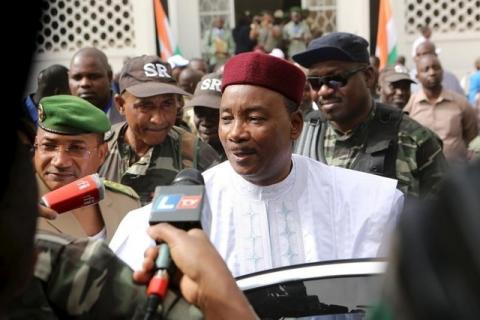Advertisement
Boycott helps Niger President Issoufou win re-election
NIAMEY (Reuters) - Niger's President Mahamadou Issoufou won a second term with 92.5 percent of the vote in a run-off election that the opposition coalition chose to boycott, the electoral commission said on Tuesday.
Issoufou, an ally of the West in its fight against Islamist insurgents in West Africa, won the first round comfortably last month with 48 percent of votes but failed to clinch the outright majority required to avoid a second round.
The candidate who came second, opposition leader Hama Amadou, has been in jail since November on charges relating to a baby-trafficking scandal, but was flown to France for medical treatment last week.
Amadou says he is innocent and claims the charges against him are politically motivated.
But the size of Issoufou's victory is unlikely to draw significant international criticism, in part because of the boycott, but also because the incumbent has been in power only since 2011.
"The Nigerien people have spoken clearly and unequivocally," said Issoufou in a statement in which he laid out his plans for a second term, including increasing security and improving the country's infrastructure. "I hail their political maturity and strong mobilization."
The Coalition for an Alternative (COPA), which unites about 20 political parties including Amadou's MODEN, called for a boycott of the polls claiming the process had been tainted by fraud.
It described the election as a "sham" and said in a statement on Tuesday that it would refuse to recognize the results.
"President Issoufou's mandate expires on April 1, 2016 at midnight. From April 2, our country will have no legitimate president," it said.
The turnout of the election was 60 percent, the commission said. The vote is subject to confirmation from the constitutional court.
Southern Niger, which borders Nigeria, has been the target of frequent deadly raids by Islamist Boko Haram militants.
It also shares borders with Burkina Faso and Mali to the west, where al Qaeda-linked groups are active. Libya, home to Islamic State affiliates, lies on its northern border.
(Reporting by Abdoulaye Massalaki; Writing by Matthew Mpoke Bigg and Edward McAllister; Editing by Richard Balmforth)



















Add new comment